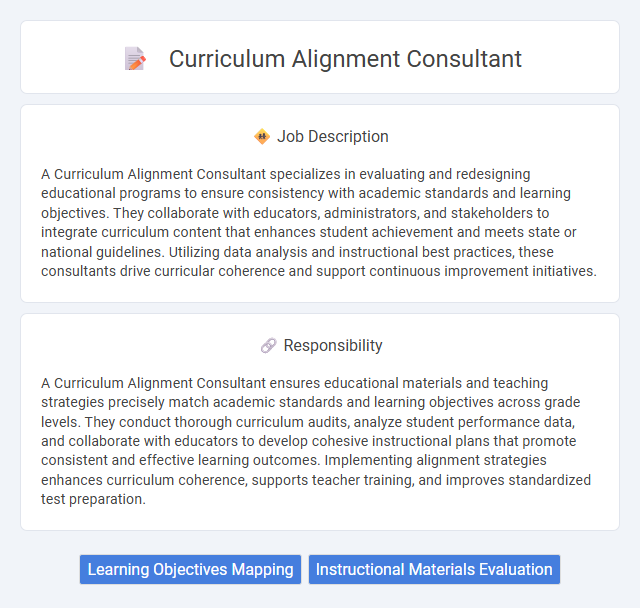
A Curriculum Alignment Consultant specializes in evaluating and redesigning educational programs to ensure consistency with academic standards and learning objectives. They collaborate with educators, administrators, and stakeholders to integrate curriculum content that enhances student achievement and meets state or national guidelines. Utilizing data analysis and instructional best practices, these consultants drive curricular coherence and support continuous improvement initiatives.
Individuals who possess strong analytical skills and a deep understanding of educational standards are likely suitable for a Curriculum Alignment Consultant role. People comfortable with collaboration and curriculum evaluation may find this job aligns with their professional strengths. Those lacking attention to detail or experience in educational frameworks might face challenges in fulfilling the job demands effectively.
Qualification
A Curriculum Alignment Consultant requires a deep understanding of educational standards, such as Common Core or Next Generation Science Standards, paired with a degree in education or curriculum development. Expertise in data analysis and instructional design software enhances their ability to align teaching materials with learning outcomes effectively. Strong communication skills are essential to collaborate with educators and administrators, ensuring curriculum coherence and compliance across grade levels.
Responsibility
A Curriculum Alignment Consultant ensures educational materials and teaching strategies precisely match academic standards and learning objectives across grade levels. They conduct thorough curriculum audits, analyze student performance data, and collaborate with educators to develop cohesive instructional plans that promote consistent and effective learning outcomes. Implementing alignment strategies enhances curriculum coherence, supports teacher training, and improves standardized test preparation.
Benefit
Hiring a Curriculum Alignment Consultant likely enhances educational consistency by closely matching instructional materials with standards and learning objectives. This role probably improves student outcomes through tailored curriculum development that addresses skill gaps and diverse learning needs. Schools may experience increased teacher satisfaction and professional growth as consultants provide targeted training and resources for effective instruction.
Challenge
The challenge faced by a Curriculum Alignment Consultant likely includes ensuring that educational content aligns accurately with evolving standards while addressing diverse student needs. Balancing stakeholder expectations, such as those from teachers, administrators, and policymakers, may complicate the alignment process. There is a probability that overcoming discrepancies between curriculum goals and practical classroom implementation presents ongoing difficulties.
Career Advancement
A Curriculum Alignment Consultant plays a crucial role in ensuring educational content meets state standards and improves student outcomes, enhancing their expertise in instructional design and assessment strategies. This position offers significant career advancement opportunities in education leadership, curriculum development, and policy advisory roles. Professionals can leverage experience to transition into higher-level roles such as Director of Curriculum, Educational Program Manager, or Academic Coordinator.
Key Terms
Learning Objectives Mapping
A Curriculum Alignment Consultant specializes in mapping learning objectives to ensure consistency between curriculum content, instructional strategies, and assessment methods. This process involves detailed analysis of educational standards and frameworks to create cohesive and measurable objectives that guide effective teaching and learning outcomes. Accurate learning objectives mapping enhances curriculum coherence, improves student performance tracking, and supports data-driven instructional decisions.
Instructional Materials Evaluation
Curriculum Alignment Consultants specialize in evaluating instructional materials to ensure they meet state standards and support effective teaching strategies. They analyze textbooks, digital resources, and assessments for content accuracy, relevance, and alignment with learning objectives. Their expertise helps schools adopt resources that enhance student achievement and comply with educational frameworks.
 kuljobs.com
kuljobs.com